Parent to Parent: Is My Child Ready for Kindergarten?
- Details
- Written by: Wendy MacMillan
- Hits: 1908
 They say it takes a village to raise a child and we can all use some neighborly or expert advice from time to time. If you find yourself in a parenting pickle and are looking for some friendly suggestions, please submit your questions here. You can submit your queries anonymously and our panel of parents (with backgrounds in education and psychology) will try our best to offer a helpful perspective. No question is too big or too small and if we can’t help, we will find someone who can!
They say it takes a village to raise a child and we can all use some neighborly or expert advice from time to time. If you find yourself in a parenting pickle and are looking for some friendly suggestions, please submit your questions here. You can submit your queries anonymously and our panel of parents (with backgrounds in education and psychology) will try our best to offer a helpful perspective. No question is too big or too small and if we can’t help, we will find someone who can!
Question:
My oldest child is currently enrolled in a pre-k class and is slated to start kindergarten next year. I’m worried because he has an October birthday and he sometimes seems much younger than the other kids in his class. We are debating whether to send him to kindergarten or let him enjoy another “cushion” year of preschool. Any advice? -Pondering Preschool
Answer:
Dear Pondering,
The decision to give your child an extra year of preschool (or Red Shirt them as some might say), is a difficult one to make! Unfortunately it is also a decision that is highly personal and dependent on each individual child and their circumstances. Since the Scarsdale School District has a December 31st cut-off date for entry into kindergarten, many parents with children who have fall birthdays might at least question whether or not their child is ready for primary school…for most, the answer is yes! If a child is seemingly thriving in preschool (meeting developmental milestones and doing well socially and emotionally), it is easy to assume the same child would also flourish in kindergarten.
If however, you have any concerns about your child’s physical, cognitive or social/emotional development, then consideration of a cushion year could be warranted. No concern is too small to explore the option, and a cushion year could give your child the boost of confidence they need to start elementary school on strong footing. While there may be some good and bad to both options, most parents who decide to “red shirt” don’t regret their choice. We encourage you to talk to your child’s teachers and reach out to the elementary school for insight and advice.
Do you have parenting questions? Submit them here!
Wendy MacMillan is a former teacher and a proud mom of two children. While her background is in psychology and education, Wendy was recently trained in mindfulness at Mindfulschools.org. She has long been passionate about wellness, and as an active member of the Scarsdale PTA, Wendy helped to bring mindfulness to her children's elementary school.
Summer 2023 Camp and Activities Guide for Scarsdale Kids
- Details
- Written by: Joanne Wallenstein
- Hits: 5048

Check out your options:
Beth El Day Camp (pictured above) in New Rochelle is the place to be for children ages 2-8! Our dynamic program is widely recognized as the best-in-class day camp in Westchester. Beth El continues to be the most fun, most trusted choice for young campers and their parents, year after year. The magic happens from Monday, June 26 - Friday, August 18, 2023. We offer before and after camp care 7am-7pm. Campers love our innovative and age-appropriate activities: the sports, especially tennis, swimming twice a day in the pool, towel service, music, art, nature, STEM, yoga, karate, our delicious lunches, and much more! We are also known for our nurturing environment and commitment to safety. We have the best-trained professional staff and a very favorable child to staff ratio. Whether this is your child's first camp experience or not, at Beth El everything begins with love and ends in fun.
Beth El Day Camp, 1324 North Avenue, New Rochelle, NY 10804, (914) 235-2700 ext. 256, [email protected]
JCC Mid-Westchester offers children ages two and older enriching and enjoyable summer  camp programs: Summer Days at the J and Summer Gymnastics at the J. Experienced counselors and caring staff engage campers with a variety of outdoor and indoor activities that spark curiosity and joy.
camp programs: Summer Days at the J and Summer Gymnastics at the J. Experienced counselors and caring staff engage campers with a variety of outdoor and indoor activities that spark curiosity and joy.
Contact Brian Symons at [email protected]. Learn more and register at jccmw.org/camps/
Oasis in Dobbs Ferry is a premier Westchester day camp located on the beautiful Mercy College campus overlooking the Hudson in Dobbs Ferry. Children, ages 3 to 16, are invited to take part in activities centered around sports, the arts, nature, daily instructional and  recreational swimming in our own pool, and most importantly, social emotional growth. Offering a variety of camp experiences, Oasis in Dobbs Ferry has something for everyone! The traditional summer camp program includes children grades K-6, Teen Travel & Jr. Teen Travel programs, as well as an ESIC (Early Start Imagination Camp) for the newest campers, ages 3-5. Oasis in Dobbs Ferry is a place to experience amazing summers & make lifelong friends!
recreational swimming in our own pool, and most importantly, social emotional growth. Offering a variety of camp experiences, Oasis in Dobbs Ferry has something for everyone! The traditional summer camp program includes children grades K-6, Teen Travel & Jr. Teen Travel programs, as well as an ESIC (Early Start Imagination Camp) for the newest campers, ages 3-5. Oasis in Dobbs Ferry is a place to experience amazing summers & make lifelong friends!
Squire Advantage and Squire Sports Camps at Maria Regina High School in Hartsdale is celebrating its 50th year and is the proud recipient of the first ever Westchester Country Inspector Choice Award! Squire Advantage Primary (grades K-3) and Advantage Choice (grades 4-9) is created for campers who wish to custom design their own schedule by choosing activities like swimming, sports, fine arts, science, cooking, archery and more. There are more than 50 different activities to choose from! Squire Camps programs run from June  26th until August 11th, 2023. Courses are taught by certified schoolteachers, and hot lunch and Early Drop off is included. Extended day and transportation available.
26th until August 11th, 2023. Courses are taught by certified schoolteachers, and hot lunch and Early Drop off is included. Extended day and transportation available.
Matt Davanzo, Director, Squire Camps, Maria Regina High School, Hartsdale, NY, (914) 328-3798
Camp Ramaquois is not like every other camp. Our day camp for boys and girls ages 3 to 15 in Pomona, NY (only 30 minutes from the George Washington Bridge and 15 minutes from the Mario Cuomo Bridge) provides a truly authentic camp experience. Our magnificent 44 acres, 5-acre lake, 9 heated swimming pools, and exceptional facilities and programs allow us to provide children with a dynamic and memorable summer filled with love, warmth, and being part of a special community. Our campers are encouraged to take healthy risks, learn new skills, develop relationships with their peers and counselors, develop independence and assume responsibility.
Camp Ramaquois, 30 Mountain Road. Pomona, NY 10970, 845-354-1600
 BBYO offers exhilarating summer programs for Jewish teens in grades 8–12. We host trips to Israel, Europe, and the Americas, and have members-only experiences for those interested in camp activities. Don’t let your teen miss out on the chance to join their friends on an unforgettable experience in some of our newest destinations like Hawaii, Greece, Ecuador, and the United Arab Emirates. Check out the Summer 2023 vibes at bbyo.org/scarsdalesummer.
BBYO offers exhilarating summer programs for Jewish teens in grades 8–12. We host trips to Israel, Europe, and the Americas, and have members-only experiences for those interested in camp activities. Don’t let your teen miss out on the chance to join their friends on an unforgettable experience in some of our newest destinations like Hawaii, Greece, Ecuador, and the United Arab Emirates. Check out the Summer 2023 vibes at bbyo.org/scarsdalesummer.
BBYO is a proud RootOne Trip Provider; $3,000 vouchers are available for trips to Israel. We also offer the New York Teen Initiative scholarship to families that live in Westchester County (last year’s average award was $1,400). Email [email protected] with any questions.

Beth El Arts & Theater Program is a place where individualized attention is offered and talent 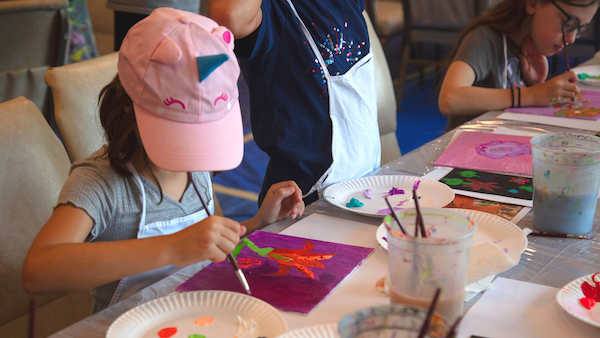 shines for campers ages 8-12. We offer a unique Arts & Theater program with options for 2, 4, 6, and 8 weeks. We welcome budding young artists, blossoming actors, acrobats, center stage performers, and everyone in between to paint, dance, craft jewelry, sing, act, improvise, and more. Artist Educators introduce campers to a variety of new experiences, valuing ensemble, and teamwork. Our program allows campers to participate in fine and performing arts with local artist educators, serve as ambassadors at the New Rochelle Farmers Market, experience culinary arts with guest chefs, and take exciting trips including a Broadway show! We also offer daily free swim, towel service, and delicious lunches.
shines for campers ages 8-12. We offer a unique Arts & Theater program with options for 2, 4, 6, and 8 weeks. We welcome budding young artists, blossoming actors, acrobats, center stage performers, and everyone in between to paint, dance, craft jewelry, sing, act, improvise, and more. Artist Educators introduce campers to a variety of new experiences, valuing ensemble, and teamwork. Our program allows campers to participate in fine and performing arts with local artist educators, serve as ambassadors at the New Rochelle Farmers Market, experience culinary arts with guest chefs, and take exciting trips including a Broadway show! We also offer daily free swim, towel service, and delicious lunches.
Beth El Arts & Theater Camp, 1324 North Avenue, New Rochelle, NY 10804, (914) 235-2700 ext. 256, [email protected]
Hoff-Barthelson Music School is the ideal setting for a stimulating, challenging, and fun-filled summer of creative exploration. Our Summer Arts Program offers rich, individually tailored experiences in music, movement, visual art, and drama. Participants benefit from expert instruction; a nurturing environment; learning and practicing with peers; exploring new instruments, styles, and 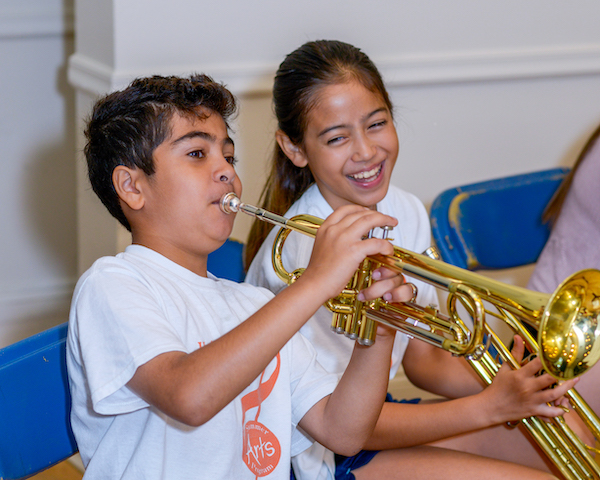 art forms; growing in their understanding of the language of music (music theory); honing performance skills; and forming lasting friendships.
art forms; growing in their understanding of the language of music (music theory); honing performance skills; and forming lasting friendships.
New for 2023: Two Customizable 3-Week Sessions!
SESSION 1: June 26–July 14
SESSION 2: July 17–August 4
Morning, Afternoon and Full Day Options
Early Drop Off and Late Pick Up Available
The Summer Arts Program is geared to students entering 1st-9th grade. Selected late afternoon offerings are available in the 1st Session for students entering 10th-12th grades. Class and ensemble content varies from Session 1 to Session 2 providing students who attend both sessions with unique and complementary learning experiences.
Classes, workshops, and performance opportunities include: Group Instruction in strings, winds, brass, guitar, piano, and percussion; Chorus; Drama; Music and Movement; Visual Arts; Orchestra; Jazz Band; Wind Ensemble; Music Technology; Piano as a Second Instrument; World Drumming; Chimes; Simple Symphony; Composers Corner; Introduction to Chamber Music; Music History Through the Ages; Reading, Writing, Listening: Building Music Literacy; Chamber Music; Crossroads Ensemble; Sing! Vocal Ensemble; and a Performance Forum. Our exceptional faculty—made up of top performers and music educators—provide personalized attention to each student.
Space is limited; enrollment is on a first come, first served basis. Early-bird registration discounts available through March 31. Partial need-based financial aid available. Hoff-Barthelson Music School, 25 School Lane, Scarsdale NY 10583, 914-723-1169. [email protected] Learn more and register here.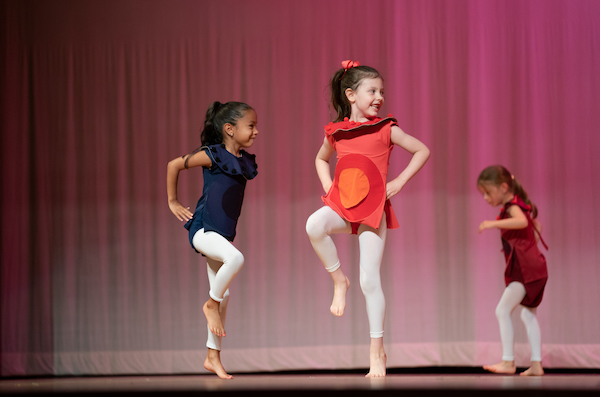 Photo Credit Ellen CraneSteffi Nossen School of Dance: Tiniest dancers to experienced college dancers can participate in a variety of dance experiences. From Story Book Dance to a two-week Companies in Residence Intensive for experienced college and high school dancers, all can enjoy the performing arts in a safe, nurturing and artistically challenging environment. The Summer begins with three Weekly Story Book Camps: a morning of movement, music, and art for preschoolers based on a new story each week (June 26-June 30, August 7 – 11, and August 14 – 18). On June 26 – 29 our second Adult Adaptive Musical Theater workshop will take place. Dance Camp July 10 –14 and July 17-21 (grades 1-5) and Dance Intensive (grade 6 and up) explore Modern, Ballet, Jazz, Hip-Hop, Musical Theater, dance history, and choreography. Musical Theater Camp (Grades 2-4) and Musical Theater Intensive (Grades 5 and up) July 24 – 28 and July 31 - August 5 – 12 train with some of the best professional teachers in the field with daily acting, voice, and dance classes to enhance vocal and acting skills while honing dance technique. Beginner – advanced performers learn music and choreography from a different Broadway musical to perform at week’s end.
Photo Credit Ellen CraneSteffi Nossen School of Dance: Tiniest dancers to experienced college dancers can participate in a variety of dance experiences. From Story Book Dance to a two-week Companies in Residence Intensive for experienced college and high school dancers, all can enjoy the performing arts in a safe, nurturing and artistically challenging environment. The Summer begins with three Weekly Story Book Camps: a morning of movement, music, and art for preschoolers based on a new story each week (June 26-June 30, August 7 – 11, and August 14 – 18). On June 26 – 29 our second Adult Adaptive Musical Theater workshop will take place. Dance Camp July 10 –14 and July 17-21 (grades 1-5) and Dance Intensive (grade 6 and up) explore Modern, Ballet, Jazz, Hip-Hop, Musical Theater, dance history, and choreography. Musical Theater Camp (Grades 2-4) and Musical Theater Intensive (Grades 5 and up) July 24 – 28 and July 31 - August 5 – 12 train with some of the best professional teachers in the field with daily acting, voice, and dance classes to enhance vocal and acting skills while honing dance technique. Beginner – advanced performers learn music and choreography from a different Broadway musical to perform at week’s end.
Steffi Nossen School of Dance, 216 Central Avenue, White Plains, NY 10606, www.steffinossen.org, [email protected], 914-328-1900
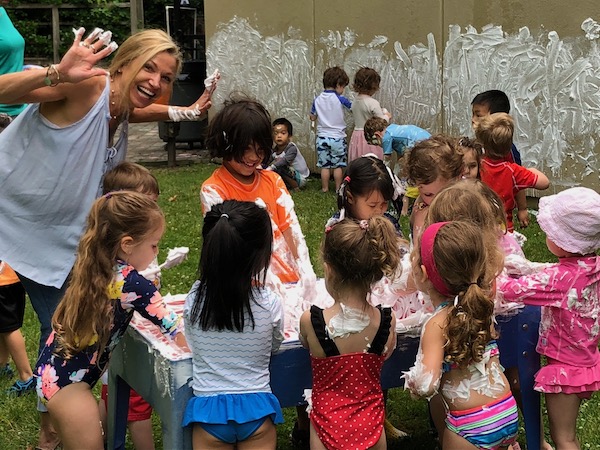 Summer Stars at Scarsdale Synagogue is the perfect summer experience for young children. This warm and nurturing seven-week summer program is for children 18 months to 5 years old. The children are engaged in activities such as sports, music, art, story time, daily water play and much, much more. There are special theme days each week such as Circus Day, Hawaiian Day or Carnival Day. At Summer Stars, friendships are formed and children grow socially, emotionally and intellectually as they engage in fun, stimulating summer activities. There is a three-day option for toddlers ages 18 to 30 months. Two year-olds may choose a three-day option or attend five mornings a week. Three to 5 year-olds may choose a half-day, 9am -12 noon option or a full day option from 9am - 2pm. Your child will sparkle and shine at Summer Stars! Contact Jody Glassman, Early Childhood Director at [email protected] or call 914-723-3001. Scarsdale Synagogue Temples Tremont and Emanu-El is a reform Jewish congregation located at 2 Ogden Road, Scarsdale. Summer Stars at Scarsdale Synagogue, 2 Ogden Road, Scarsdale, NY, www.sstte.org
Summer Stars at Scarsdale Synagogue is the perfect summer experience for young children. This warm and nurturing seven-week summer program is for children 18 months to 5 years old. The children are engaged in activities such as sports, music, art, story time, daily water play and much, much more. There are special theme days each week such as Circus Day, Hawaiian Day or Carnival Day. At Summer Stars, friendships are formed and children grow socially, emotionally and intellectually as they engage in fun, stimulating summer activities. There is a three-day option for toddlers ages 18 to 30 months. Two year-olds may choose a three-day option or attend five mornings a week. Three to 5 year-olds may choose a half-day, 9am -12 noon option or a full day option from 9am - 2pm. Your child will sparkle and shine at Summer Stars! Contact Jody Glassman, Early Childhood Director at [email protected] or call 914-723-3001. Scarsdale Synagogue Temples Tremont and Emanu-El is a reform Jewish congregation located at 2 Ogden Road, Scarsdale. Summer Stars at Scarsdale Synagogue, 2 Ogden Road, Scarsdale, NY, www.sstte.org
Westchester Reform Temple's Summer Play Place Camp offers young children (starting at 15 
Summer Play Place Camp, 255 Mamaroneck Road, Scarsdale, NY 10583, 914-723-5493, Email: [email protected]
McGinn Examines Why Busyness Does Not Lead to Happiness
- Details
- Written by: Wendy MacMillan
- Hits: 2638
 Is your child stressed out, cranky, or full of anxiety? According to Dr. Lata K. McGinn, these may be signs that your child is overscheduled. As parents we want the very best for our children and try to give them every opportunity for a successful, fulfilling life. In a presentation sponsored by the Scarsdale Parent Teacher Council and CHILD, Dr. McGinn explored the negative impact scheduling too many structured activities, lessons, sports, tutors, etc. can have on our children and their mental health.
Is your child stressed out, cranky, or full of anxiety? According to Dr. Lata K. McGinn, these may be signs that your child is overscheduled. As parents we want the very best for our children and try to give them every opportunity for a successful, fulfilling life. In a presentation sponsored by the Scarsdale Parent Teacher Council and CHILD, Dr. McGinn explored the negative impact scheduling too many structured activities, lessons, sports, tutors, etc. can have on our children and their mental health.
In the first part of her presentation Dr. McGinn, a clinical psychologist and co-founder of Cognitive and Behavioral Consultants (CBC), acknowledged that the overscheduled child is not entirely the fault of well-meaning parents and explored some of the ways in which our modern U.S. society contributes to the pressure to perpetually achieve. She began by dubbing “America the Beautiful” as “America the Busy” and highlighted that although Americans work longer than most other advanced economies, America is not the most productive. Instead, Norway is the most productive economy per hour, where work is capped at 37.5 hours per week. McGinn illustrated this difference to point out that working longer hours doesn’t equal more productivity…just as piling on more activities to growing children doesn’t make them more competitive.
So why do Americans, whom many are reportedly “too busy to sleep or date,” keep working as much as they do? According to McGinn it is partially due to our financial achievement-oriented society where we are caught in a “work and spend '' spin cycle. She also pointed out that not only are costs ballooning but there is greater pressure to put your life on social media and to keep up with what we might see on Instagram. Additionally, in the U.S, being busy makes people in our culture feel important, people share their busyness as a status symbol, and feel guilty about having leisure time…all of which upholds the sense of importance we have created in our society to keep our schedules filled to the brim. As McGinn shared in one of her slides, studies show Americans feel like they are working harder than ever, have less time, and live more frenetic lives where even leisure time is splintered to attend to multiple tasks at once.
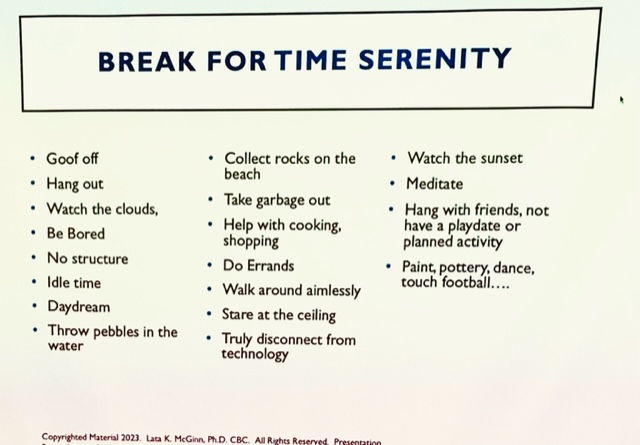
In contrast, places like Denmark are not only more productive, but also place great value on Hygge which the Oxford Dictionary defines as “a quality of coziness and comfortable conviviality that engenders a feeling of contentment or well-being (regarded as a defining characteristic of Danish culture).” The Hygge culture includes an emphasis on time spent with family, friends, and time alone in addition to value given to leisure time, fun, and simplicity. As a result, the United Nations ranks Denmark as #1 in their World Happiness Report while the U.S. sits at #11. Of course Denmark is far from perfect and there are many other factors that contribute to their sense of well-being…McGinn highlighted their Hygge culture in hopes that we can learn from them and improve our own cultural ideologies.
Dr. McGinn went on to discuss how cultural pressure in the U.S. is affecting our society. She pointed out that according to the World Health Organization, “Americans live in the richest country but are the most anxious.” Also, according to Child Development, “the average high school student experiences the same level of anxiety as the average psychiatric patient in the 1950’s.” These statistics date back to before the Covid Pandemic and since then, McGinn warns that our children have experienced a mental health tsunami. Of course a busier, overscheduled life isn’t solely responsible for the mental health crisis children are experiencing, McGinn includes these other factors as well:
-Actual persistent threat and disruptions in addition to perceived dangers. McGinn discussed how there is so much going on in the world and we all have such quick easy access to the news. We read about something terrible happening halfway across the world and it makes us feel anxious. She also explained that our brains aren’t equipped to deal with the persistent tension we feel from the threat of things like school shootings.
-Living with less social support than previous generations.
-Intense rising pressures.
-Socio-cultural changes.
-Digital Age/Social Media. McGinn suggests watching the video “Like” which explores the impact of social media on our lives.
-Increased scaffolding which McGinn described as parents doing too much for their children because their children are so busy with their structured schedules. Children today aren’t doing chores or running errands like they did before and are thus missing out on learning important life skills.
Moving on, McGinn outlined the impact of over-enrichment. She first recognized that enrichment and the enriching activities we sign our kids up for like ballet, soccer, chess, music lessons, debate, acting, and so much more are healthy and important when it helps an individual to thrive. The impact of over enrichment however, is burnout and burnout is the opposite of thriving. Furthermore, as McGinn explained, burnout leads to a lack of motivation and poor performance. Other detrimental effects of over-enrichment include:
-The creation of unrelenting standards where people are expected to be on a journey for some sort of mastery.
-An inability to tolerate boredom. Because they have no time to be bored, children today don’t know how to deal with boredom and quickly turn to their devices for comfort. They don’t give themselves any time to daydream, think, or reflect and this all impacts their sense of curiosity and creativity.
-Negative impacts on autonomy, self-direction, and sense of self. When parents schedule activities for their children or force children to stick with something they don’t want to, it doesn’t allow space for a child to explore their own interests and hobbies.
-Can increase mental health issues such as anxiety which is a gateway disorder.
While these detrimental effects of overscheduling can be worrisome, McGinn reminds us that parents, schools, colleges, and employers are in this together and can all be a part of the solution. She encouraged her audience to make little changes to their own children’s lives and that collectively we can create an ocean of change.
McGinn proposed to start by increasing awareness of the busyness we create in our own lives and what we model for our children. She also spoke of the “Selfie Syndrome” and how management of technology is one of the most important changes we can make as parents. She described The Selfie Syndrome as a condition that is all about self-promotion, personal, branding, and self-interest at the exclusion of others feelings, needs, and concerns. She went on to describe four reasons that we should be concerned:
-We see a measurable dip in empathy among today’s youth and a significant increase in narcissism
-We observe a clear increase in peer cruelty
-We observe more cheating and weaker moral reasoning in young people
-Our plugged-in. high-pressure culture is leading to a mental health epidemic among young people
In other slides, McGinn illustrated how since the invention of the smartphone there has been a marked decline in how much time children spend hanging out with their friends, a huge jump in feelings of loneliness, a sharp increase in teens not getting enough sleep, and a decrease in the percentage of teenagers who go out on dates.
To help combat the overuse of smartphones, McGinn suggests:
-Be balanced and open-minded in your family discussions on this topic.
-No screens at the table during meal times.
-Model appropriate digital etiquette to your kids.
-Keep all screens out of the bedroom at night to reduce temptation.
-Turn off notifications so you can check when YOU are ready and have time.
-Convert iPhone colors to black and white…less color is less enticing.
In the quest to reduce the number of activities in our children’s schedules, Dr. McGinn suggests we make “Approach Decisions” vs, “Fear Based Decisions” about their after-school activities. Some questions you might ask are:
-Will they enjoy it?
-Will they gain mastery?
-Are they getting enough time to play/take a break?
Dr. McGinn also encouraged us all to “work smarter, not more” and to move away from busyness and towards serenity as a value. She further encouraged her audience to be in the present moment and to identify sources of burnout, to cultivate breaks/leisure/hobbies for pleasure, and to simplify our lives. To conclude, McGinn stressed that it is all about balance and that our plates should be full of equal parts activities for pleasure and activities for mastery, structure and no structure, enrichment and relaxation.
At the conclusion of her presentation, Dr. McGinn answered questions from the audience. One mother spoke about how it would be easier to choose less for our children if it were driven from “upstream.” She then asked if Dr. McGinn felt like colleges and universities are discussing the impact of overscheduling and if she felt they are open to making changes. Dr. McGinn answered that colleges and universities are being overwhelmed by the amount of students who are dealing with mental health issues including anxiety and depression and are thus, forced to take the issue very seriously. She believes that most are already taking actions to make much needed changes.
 A recording of this PTC/CHILD program will soon be available on the District’s website.
A recording of this PTC/CHILD program will soon be available on the District’s website.
Lata K. McGinn, PhD is a clinical psychologist and is a tenured Professor of Psychology and Director of the CBT training program at the Ferkauf Graduate School of Psychology, Yeshiva University. She is co-founder of Cognitive and Behavioral Consultants (CBC), an evidence-based treatment and training center in New York. She specializes in cognitive-behavioral treatment of anxiety, depression and related disorders. Aside from having multiple published articles, books and extensive presentations she has been highlighted by various media outlets including NBC, Huffington Post, USA Today, Elite Daily, Parents, Shape, Bustle and others. See her full bio here.
Letter: A Parent’s Perspective: It Takes a Community to Block Anti-LGBTQ+ Hate
- Details
- Written by: Amanda Levin Pymm
- Hits: 4013
 This letter was submitted by Amanda Levin Pymm (she/her) and Michael Pymm (he/him)
This letter was submitted by Amanda Levin Pymm (she/her) and Michael Pymm (he/him)
We’re one of many typical families in Scarsdale who moved here because we wanted to raise our children in this wonderful community. What makes us not so typical is that we have a child (they/them) who identifies as LGBTQ+ and is moving along the gender spectrum. As they were assigned male at birth, the assumption is that they are a boy, but they are not.
However, they are frequently misgendered. There are some transgender people who are perceived as cisgender instead of the sex they were assigned at birth. A trans person who is perceived as cisgender may face less prejudice, harassment, and risk of violence. We are fortunate and grateful to be part of a community that is supportive of our child, but we do not live in a bubble because our child looks different.
Most parents, including us, raise their children with the expectations and restrictions of the gender binary – the classification of gender into two distinct, opposite forms of masculine and feminine, based on a dated social system and cultural beliefs. Thus, when we see people who are breaking free from the gender binary, it’s instinctual to look and glare. Some take it a step further and follow us around and snicker. As such, our child and family struggle every single day because we stand out wherever we go, and we always have our guard up. Are we safe? Are we ok? Are there police officers around who can help, if necessary? Should we just leave? Our world has become smaller and smaller.
The world remains a difficult place for the LGBTQ+ community. Nationwide, more than two dozen anti-LGBTQ+ bills were enacted this year out of more than 250 introduced and there were a reported 32 violent deaths of LGBTQ+ people in 2022, according to the Human Rights Campaign. The Trevor Project estimates that more than 1.8 million LGBTQ+ youth seriously consider suicide each year in the U.S. — and at least one attempts suicide every 45 seconds.
We watch and worry a lot, hearing so many voices raised against them. So, when we heard that one of those voices (Kirk Cameron, an anti-LGBTQ+ actor-writer) was coming to Scarsdale, to one of our community spaces, our initial reaction was to organize a peaceful gathering. For a while it felt good, as it was a way to take action against those fears about the wider world.
However, a voice only has the power that we give it by listening. So, after the reaction passed and we spoke to community members, we now believe the right response to this event is— nothing. We can show this voice that he means nothing to us by simply not listening to him. We don’t want to support this voice’s attempt to generate controversy, divide people, push an agenda, raise his profile, and make money off it.
Instead, it has been a good reminder that we have our own job to do. The community we have here doesn’t happen by accident, and to keep hate out we must keep working on tolerance, education, and acceptance.
We would like to channel the energy and support we have seen over the last few days to support our wonderful Scarsdale Public Library and partner with them to organize and promote programming that affirms and supports the LGBTQ+ community. From the very beginning, the library has shown us nothing but love and support and we are forever grateful.
We also want to thank our Scarsdale neighbors. Please know that we have received your kind messages and we are still working to respond to all of them. We thank you for sending us so much love.
To our fellow mommy and daddy bears in Scarsdale who have LGBTQ+ children and family—some of you we knew and some we did not—working with you and connecting over the past few days has meant the world to us. Knowing that we are not alone makes us feel better.
We also want to thank Sheryl Spivack Braun, who has guided and supported us, and many other parents of LGBTQ+ youth, through some very challenging times. You are a true community leader.
As we look ahead, we urge everyone to please continue to unite at this time and do our best to keep hate out of our community.
Hate has no home in Scarsdale. Only love.
A Call to Men: Changing Norms for Changing Times
- Details
- Written by: Joanne Wallenstein
- Hits: 2014
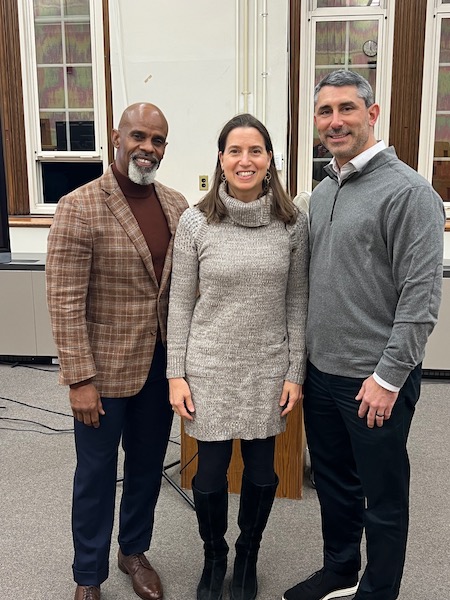 Ted Bunch from A Call to Men, Michelle Sterling from Amy Paulin's Office and Jay Genova from Scarsdale Family Counseling ServiceWhen we tell a crying little boy to “act like a man,” or say to another little boy, “you throw like a girl,” what messages are we sending to them about social norms and gender roles? By teaching boys to be dominant, aggressive and tough are we creating the next generation of bullies and sexual offenders?
Ted Bunch from A Call to Men, Michelle Sterling from Amy Paulin's Office and Jay Genova from Scarsdale Family Counseling ServiceWhen we tell a crying little boy to “act like a man,” or say to another little boy, “you throw like a girl,” what messages are we sending to them about social norms and gender roles? By teaching boys to be dominant, aggressive and tough are we creating the next generation of bullies and sexual offenders?
That was the subject of a revelatory talk by Ted Bunch from “A Call to Men” at Scarsdale High School on December 7. The event was sponsored by Scarsdale Family Counseling Service and the Scarsdale Safe Coalition and underwritten by a grant secured through the office of Assemblymember Amy Paulin.
Bunch and Tony Porter founded “A Call to Men” twenty years ago to promote healthy manhood and an equitable and inclusive culture. Bunch is a frequent guest on television and radio and even served as a consultant for the television series, “Law & Order, Special Victims Unit.” The group works with many of national athletic organizations such as the NBA and NFL and college coaches to bring their message of “healthy manhood” to players in an effort to teach them to value and respect women, girls, LGBQ and trans people and to value themselves. They also counsel companies and organizations to fight discrimination and harassment in the workplace.
The foundation of Bunch’s message was found in “The Man Box,” which illustrates the expectations that men are “expected to be strong, successful, powerful, dominating, fearless, in control and emotionless.” Bunch “unpacked” these ideas and showed how they ultimately lead to the mistreatment of women and create mental illness in men. With limited emotional language skills and an inability to ask for help, many men face mental health challenges. In fact, men are 3.5 times more likely to die from suicide than women. Bunch says we need to give men permission to express fear and sadness and to show them how to ask for help when they need it. He said, “We need to rethink how men are taught to act and behave.”

By educating men, society can decrease violence against women. Bunch said, “The more we increase healthy manhood the more we decrease domestic violence, gun violence, assault, bullying.”
Tony Porter of A Call to Men offers a powerful TED talk on the subject, viewed 3.4 million times here. Watch it to redefine some of your most basic assumptions.







